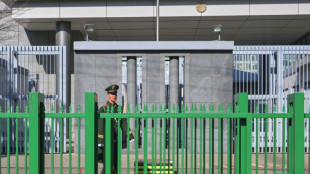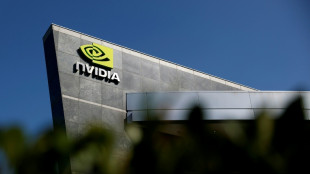
-
 Trump hosts Saudi prince for first time since Khashoggi killing
Trump hosts Saudi prince for first time since Khashoggi killing
-
Tonga's Katoa out of NRL season after brain surgery

-
 Japan warns citizens in China over safety amid Taiwan row
Japan warns citizens in China over safety amid Taiwan row
-
In Somalia, a shaky front line barely holds back the 'dogs of war'

-
 Shares in 'Baby Shark' studio jump on market debut
Shares in 'Baby Shark' studio jump on market debut
-
Thunder breeze past Pelicans, Pistons overpower Pacers

-
 Grieving Cowboys remember Kneeland, defeat Raiders
Grieving Cowboys remember Kneeland, defeat Raiders
-
Loaf behind bars: Aussie inmate says Vegemite a human right

-
 In film's second act, 'Wicked' goes beyond Broadway musical
In film's second act, 'Wicked' goes beyond Broadway musical
-
Asian markets track Wall St down with Nvidia, US jobs in view

-
 Scott Boland: the best 'spare' fast bowler around
Scott Boland: the best 'spare' fast bowler around
-
Fire and Ashes: England bank on fast bowling barrage in Australia

-
 North Korea says Seoul-US sub deal will trigger 'nuclear domino' effect
North Korea says Seoul-US sub deal will trigger 'nuclear domino' effect
-
Education for girls hit hard by India's drying wells

-
 Haitian gangs getting rich off murky market for baby eels
Haitian gangs getting rich off murky market for baby eels
-
Trump says will talk to Venezuela's Maduro, 'OK' with US strikes on Mexico

-
 Oscar Piastri wins Australia's top sports honour
Oscar Piastri wins Australia's top sports honour
-
'Severely restricted': Russia's Saint Petersburg faces cultural crackdown

-
 Polish PM denounces 'sabotage' of railway supply line to Ukraine
Polish PM denounces 'sabotage' of railway supply line to Ukraine
-
UK toughens asylum system with radical overhaul

-
 Carney's Liberals pass budget, avoiding snap Canada election
Carney's Liberals pass budget, avoiding snap Canada election
-
LeBron back in training, edges closer to Lakers return

-
 Climate talks run into night as COP30 hosts seek breakthrough
Climate talks run into night as COP30 hosts seek breakthrough
-
Germany and Netherlands lock up World Cup spots in style

-
 Germany's Woltemade hopes for 2026 World Cup spot after scoring again
Germany's Woltemade hopes for 2026 World Cup spot after scoring again
-
Germany 'send message' with Slovakia rout to reach 2026 World Cup

-
 Trump unveils fast-track visas for World Cup ticket holders
Trump unveils fast-track visas for World Cup ticket holders
-
Netherlands qualify for World Cup, Poland in play-offs

-
 Germany crush Slovakia to qualify for 2026 World Cup
Germany crush Slovakia to qualify for 2026 World Cup
-
Stocks gloomy on earnings and tech jitters, US rate worries

-
 'In it to win it': Australia doubles down on climate hosting bid
'In it to win it': Australia doubles down on climate hosting bid
-
Former NFL star Brown could face 30 yrs jail for shooting case: prosecutor

-
 Fate of Canada government hinges on tight budget vote
Fate of Canada government hinges on tight budget vote
-
New research measures how much plastic is lethal for marine life

-
 Mbappe, PSG face off in multi-million lawsuit
Mbappe, PSG face off in multi-million lawsuit
-
EU defends carbon tax as ministers take over COP30 negotiations

-
 McCartney to release silent AI protest song
McCartney to release silent AI protest song
-
Stocks tepid on uncertainty over earnings, tech rally, US rates

-
 Louvre shuts gallery over ceiling safety fears
Louvre shuts gallery over ceiling safety fears
-
'Stranded, stressed' giraffes in Kenya relocated as habitats encroached

-
 US Supreme Court to hear migrant asylum claim case
US Supreme Court to hear migrant asylum claim case
-
Western aid cuts could cause 22.6 million deaths, researchers say

-
 Clarke hails Scotland 'legends' ahead of crunch World Cup qualifier
Clarke hails Scotland 'legends' ahead of crunch World Cup qualifier
-
S.Africa says 'suspicious' flights from Israel show 'agenda to cleanse Palestinians'

-
 South Korea pledges to phase out coal plants at COP30
South Korea pledges to phase out coal plants at COP30
-
Ex-PSG footballer Hamraoui claims 3.5m euros damages against club

-
 Mbappe, PSG in counterclaims worth hundreds of millions
Mbappe, PSG in counterclaims worth hundreds of millions
-
Two newly discovered Bach organ works unveiled in Germany

-
 Stocks lower on uncertainty over earnings, tech rally, US rates
Stocks lower on uncertainty over earnings, tech rally, US rates
-
Barca to make long-awaited Camp Nou return on November 22


AI anxiety as computers get super smart
From Hollywood's death-dealing Terminator to warnings from genius Stephen Hawking or Silicon Valley stars, fears have been fueled that artificial intelligence (AI) could one day destroy humanity.
Tech titans are racing toward creating AI far smarter than people, pushing US President Joe Biden to impose emergency regulation and the European Union seeking major legislation to be agreed by the end of this year.
A two-day summit starting Wednesday in London will explore regulatory safeguards against AI risks such as those below.
- Job stealer? -
The success of ChatGPT from OpenAI has ignited debate about whether "generative AI" capable of quickly producing text, images and audio from simple commands in everyday language is a tremendous threat to jobs held by people.
Automated machinery is already used to do labor in factories, warehouses, and fields.
Generative AI, however, can take aim at white-collar jobs such as lawyers, doctors, teachers, journalists, and even computer programmers.
A report from the McKinsey consulting firm estimates that by the end of this decade, as much as 30 percent of the hours worked in the United States could be automated in a trend accelerated by generative AI.
Boosters of such technology have invoked the notion of a universal basic income in which machines generate wealth that is shared with people freed of the burdens of work.
But it is also possible companies would reap profits of improved efficiencies, leaving those out of work to fend for themselves.
- Copycat? -
Artists were quick to protest software such as Dall-E, Midjourney and Stable Diffusion that are capable of creating images in nearly any style on demand.
Computer coders and writers followed suit, critiquing AI creators for "training" software on their work, enabling it to replicate their styles or skills without permission or compensation.
AI models have been taught using massive amounts of information and imagery found online.
"That's what it trains on, a fraction of the huge output of humanity," OpenAI co-founder Sam Altman said at a conference in September.
"I think this will be a tool that amplifies human beings, not replace them."
- Disinformation tools? -
Fake news and deepfakes have been around for years but being able to easily crank it out using generative AI raises fears of rampant online deception.
Elections run the risk of being won by those most adept at spreading disinformation, contends cognitive scientist and AI expert Gary Marcus.
"Democracy depends on access to the information needed to make the right decisions," Marcus said.
"If no one knows what's true and what's not, it's all over".
- Fraud? -
Generative AI makes it easier for scammers to create convincing phishing emails, perhaps even learning enough about targets to personalize approaches.
Technology lets them copy a face or a voice, and thus trick people into falling for deceptions such as claims a loved one is in danger, for example.
US President Biden called the ability of AI to imitate people's voices "mind blowing" while signing his recent executive order aimed at the technology.
There are even language models trained specifically to produce such malicious content.
- Human role models -
As with other technologies with the potential for good or evil, the main danger is posed by humans who wield it.
Since AI is trained on data put on the web by humans, it can mirror society's prejudices, biases, and injustices.
AI also has the potential to make it easier to create bioweapons; hack banks or power grids; run oppressive government surveillance, and more.
- AI overlord? -
Some industry players fear AI could become so smart that it could seize control from humans.
"It is not difficult to imagine that at some point in the future, our intelligent computers will become as smart or smarter than people," OpenAI co-founder and chief scientist Ilya Sutskever said at a recent TED AI conference.
"The impact of such artificial intelligence is going to be truly vast."
OpenAI and rivals maintain the goal is for AI to benefit humanity, solving long-intractable problems such as climate change.
At the same time, AI industry leaders are calling for thoughtful regulation to prevent risks such as human extinction.
H.Jarrar--SF-PST




